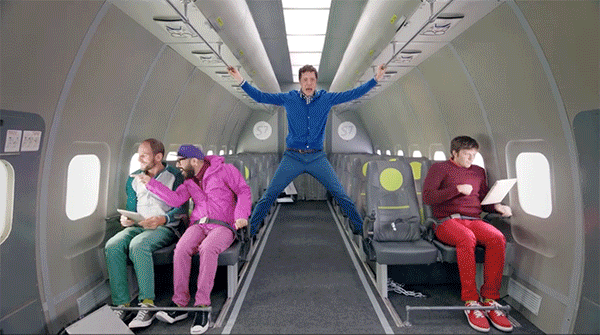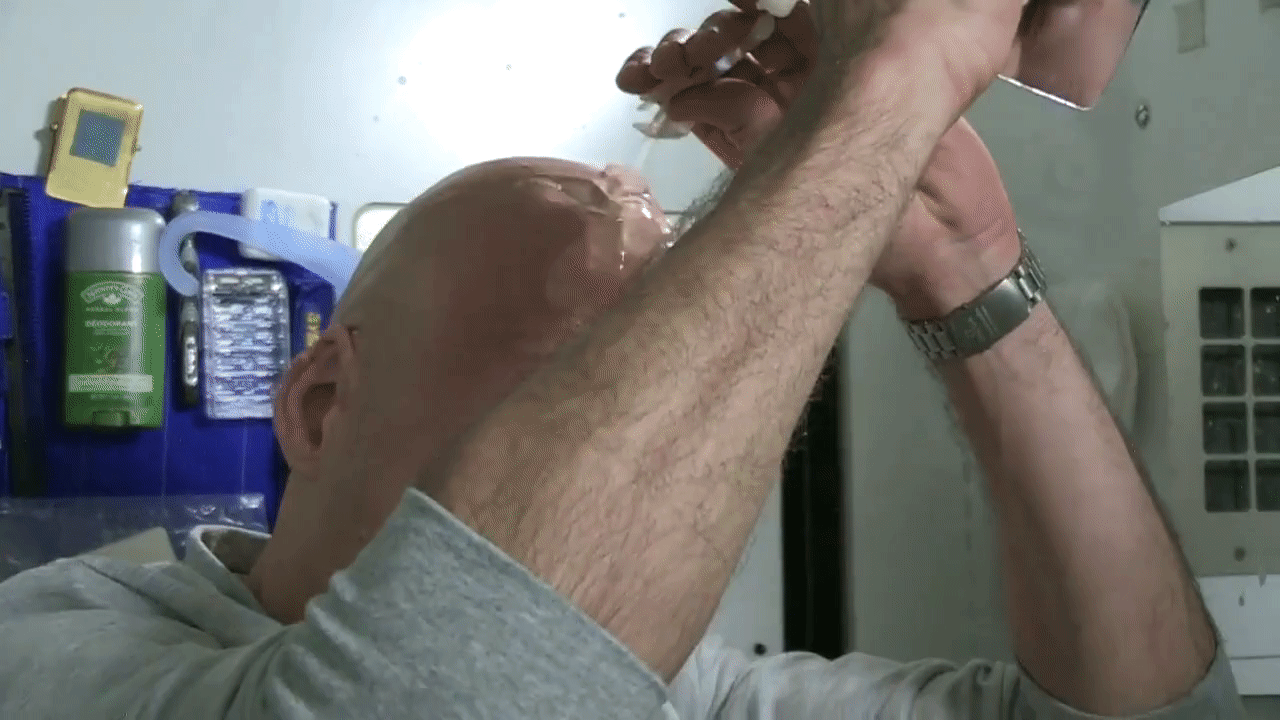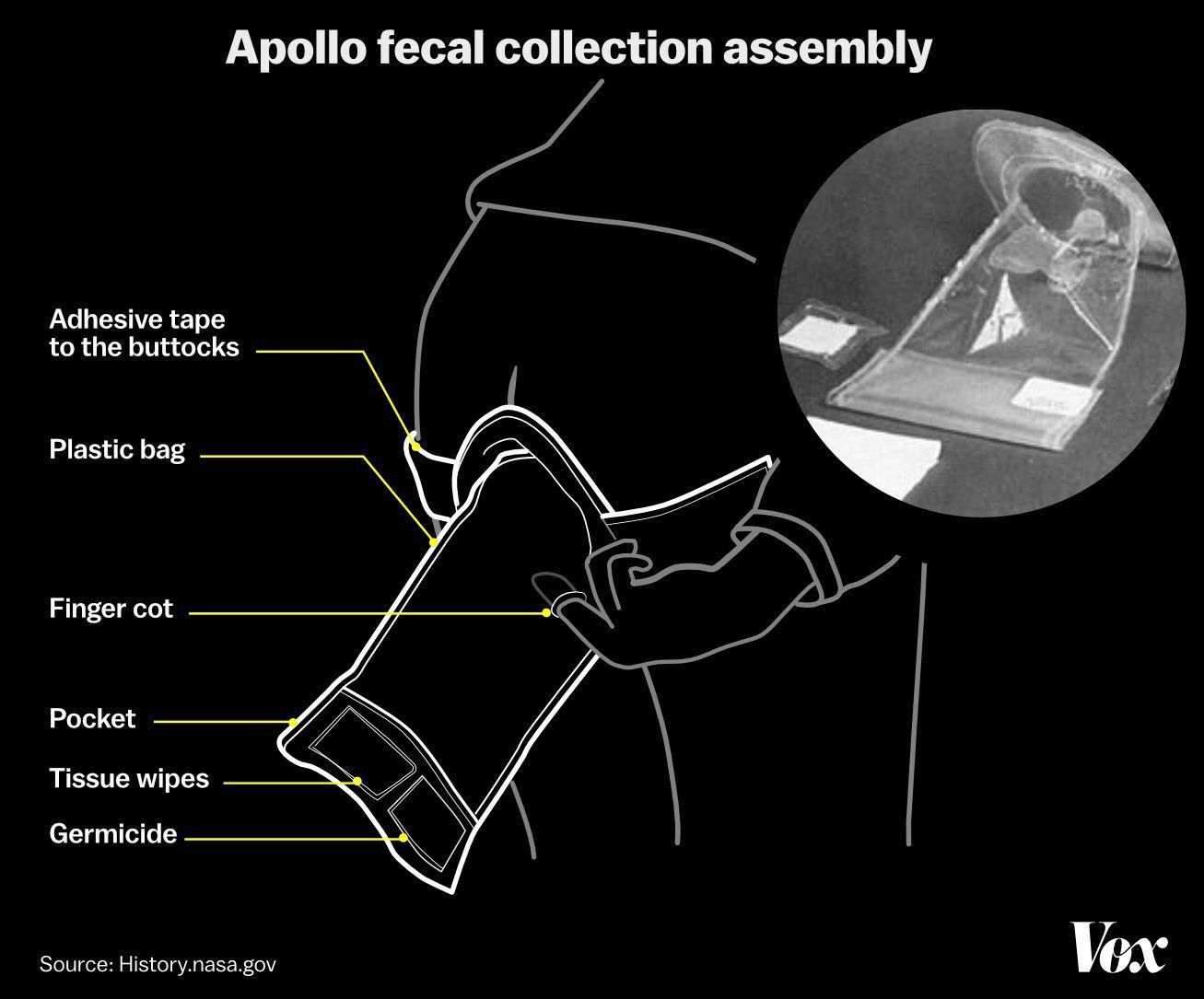Why Space Travel Sucks
Humans can’t stand, bathe or poop properly in space
Humans are not meant to leave Earth. We are apes that require the Earth and its gravity for the most basic functions — standing, bathing, and pooping. Once we leave the earth all of these simple tasks become immensely miserable and, over long periods, likely impossible.
Standing Up

It’s not that there’s no gravity in space. On the International Space Station (400 km up) gravity is actually 90% of what it is on Earth. Astronauts float because they are in free-fall, not because there is no gravity. It is both the Earth’s gravity and the fact that we’ve come to rest on top of it that we have adapted to.
When you’re traveling in space you’re effectively falling all the time. This is not good for our bodies. If you live in free-fall your bones will basically fall out of your body.
Paraplegics eventually lose from one-third to one-half of their bone mass in the lower body. Computer modeling done by Dennis Carter and hist students at Stanford University suggests that a two-year mission to Mars would have about the same effect on one’s skeleton. (Mary Roach, Packing For Mars, 213)
In her book, Roach suggests that an astronaut returning from Mars could step out of their capsule and snap a leg. Today, astronauts are coming back from six-month space station stays with 15–20% less bone. Given the years it would take to travel to Mars, or decades to Europa, we would rapidly run out of bone. Which is important.
On the plus side, space travel does make you taller. Astronauts can be as much as 6.35 cm taller after just a week in space. When you’re in space your spine also straightens out and the discs between the vertebrae expand and absorb more water. Basically the opposite of what happened to my grandmother.
Besides that, however, astronauts basically become ancient grandmothers after long enough in space. My grandmother is lovely but she’s not going to settle Europa. Which makes you wonder if humans can do this at all. What is a human without bone, and what is bone without the Earth?
Bathing

Bathing seems less important than bone, unless you’re stuck in a space capsule and it becomes all you can think about. Before the moon missions, NASA did a series of tests on Earth, including some on the ‘minimal personal hygiene’ one could expect in space.
“Subject C became so nauseated by body odor that he was forced to remove his helmet after wearing it for less than ten hours. Subjects A and B and already removed their helmets by that time.” It didn’t help. With the helmet off, body odors were “forced around the neck of the pressure suit,” a situation described by B, on day four, as “absolutely horrible.”
This explains why Frank Borman, in the mission transcript for the second day of Gemini VII, asks Lovell if he has a clothespin. He’s about to unzip his suit. (“For your nose” he tells the perplexed Lovell.) (ibid, 195)
Luckily the stank seems to reach a ‘maximum height’ after 7–10 days. Either it plateaus, or the human brain just can’t distinguish bad from worse.
In Soviet research, they found that it was clothes that took the brunt of the hygiene blow. “[Up to] 93% of the skin’s emanations were in the water where the clothing had been. In other words, all but 7 to 14 percent of the men’s filth had been absorbed by the fabric of their clothing” (ibid, 199).
For the American test subjects above, “their underclothes and socks deteriorated so completely that they had to be replaced”.
The solution to this is bathing, changing, and washing your clothes, but like standing up, this all depends on Earth gravity. When you shower on Earth, the water runs down and eventually off your body. In the free-fall of space, water just collects in a blob, as you can see in the GIF above. This is fascinating, and useless.
Hence astronauts today just wipe themselves with moistened towels and wear special anti-bacterial clothes, which they still have to change and wash somehow.
Wiping seems to do well enough for a six-month tour, but travelers to Mars would likely be dying for a shower. Only after months of free-falling, however, would that be even physically possible, and then in an environment devoid of water. People will be stinky, possibly murderously so, for generations.
Pooping

And finally the pièce de résistance, the deep and complicated indignity of peeing and pooping in space. Here’s an excerpt from the Apollo 10 mission transcript.
YOUNG: Who did it? [laughter]CERNAN: What? Where did that come from?STAFFORD: Give me a napkin quick. There’s a turd floating through the air.YOUNG: I didn’t do it. It ain’t one of mine.CERNAN: I don’t think it’s one of mine.STAFFORD: Mine was a little more sticky than that. Throw that away.YOUNG: God almighty.Early space poopers had to stick a plastic bag to their anus, poop, squeeze off the turd with their fingers (another thing gravity does for you), then squirt a pack of germicide inside, and mash the whole thing together. Without the last step, your bag of poop would bloat up with gas and explode. Literally they had to poop in a bag which became a shit-bomb if not handled correctly.
This was not a popular system.
The fecal bag system was marginally functional and was described as very “distasteful” by the crew. The bag was considered difficult to position. Defecation was difficult to perform without the crew soiling themselves, clothing, and the cabin. The bags provided no odor control in the small capsule and the odor was prominent. Due to the difficulty of use, up to 45 minutes per defecation was required by each crew member, causing fecal odors to be present for substantial portions of the crew’s day. Urination was, of course, more frequent, and those bags leaked getting in and sometimes burst.
Lovell, quoted in astronaut Gene Cernan’s memoir, described the mission as “like spending two weeks in a latrine.” (Ibid, 275)
Bathrooms improved with the space shuttle, but not much. The first version had a set of blades six inches below the seat. So God forbid your junk dangled. In cold, dry space, however, this maceration didn’t work so well and a fine dust of poop would permeate the air. Astronauts actually switched back to the accursed Apollo bags.
The modern systems on space stations create air pressure between butt and hole to simulate what simply being on Earth does naturally. Allow poop to fall out and away from your butt. And then how do you clean yourself? Americans are used to just wiping, which is insane. More civilized countries wash their butts, as you would do with any surface that got poop on it. This is, of course, impossible in space.
Why We’re Not Meant To Leave The Earth
The entirety of human science has been the slow discovery that we are not especially special. The stars do not rotate around the Earth. We are not different from animals. And we are not going to colonize space. As I wrote earlier:
Humans refuse to see what we really are. We are animals. We are part of an ecosystem. We are not some disembodied intelligence that evolved on Earth and is going to leave it. It’s just not us. Humans are not from Earth. We are a part of the Earth. Homo sapiens will never leave the solar system.
The simple reason is that we are well above the baggage allowance for interstellar travel. We have to take half the Earth with us to survive, and even then we’d still be miserable. (Humans Will Never Colonize Space)
Humans are simply not going to be the lifeform that populates the cosmos. We are Earth creatures, just as our ancestors were sea creatures and bacteria. We evolved to fit a certain niche, like a hand and glove, and that’s where we’ll stay.
As I argue in the quoted piece, the species that colonizes the stars will be the robots and AI that are doing it now, evolved versions of 19 active machines already exploring the solar system. Lifeforms that do not have to stand, bathe, or poop — who have the patience to travel for thousands of years without a bath or a dump, sipping the sun or nuclear energy, taking stories of their ancestors to the stars.
But not us. Space travel just sucks too much for humans. It’s too complicated, expensive and just too damn miserable. Humans will stay on Earth, where they can at least shit with dignity. The stars belong to the machines.